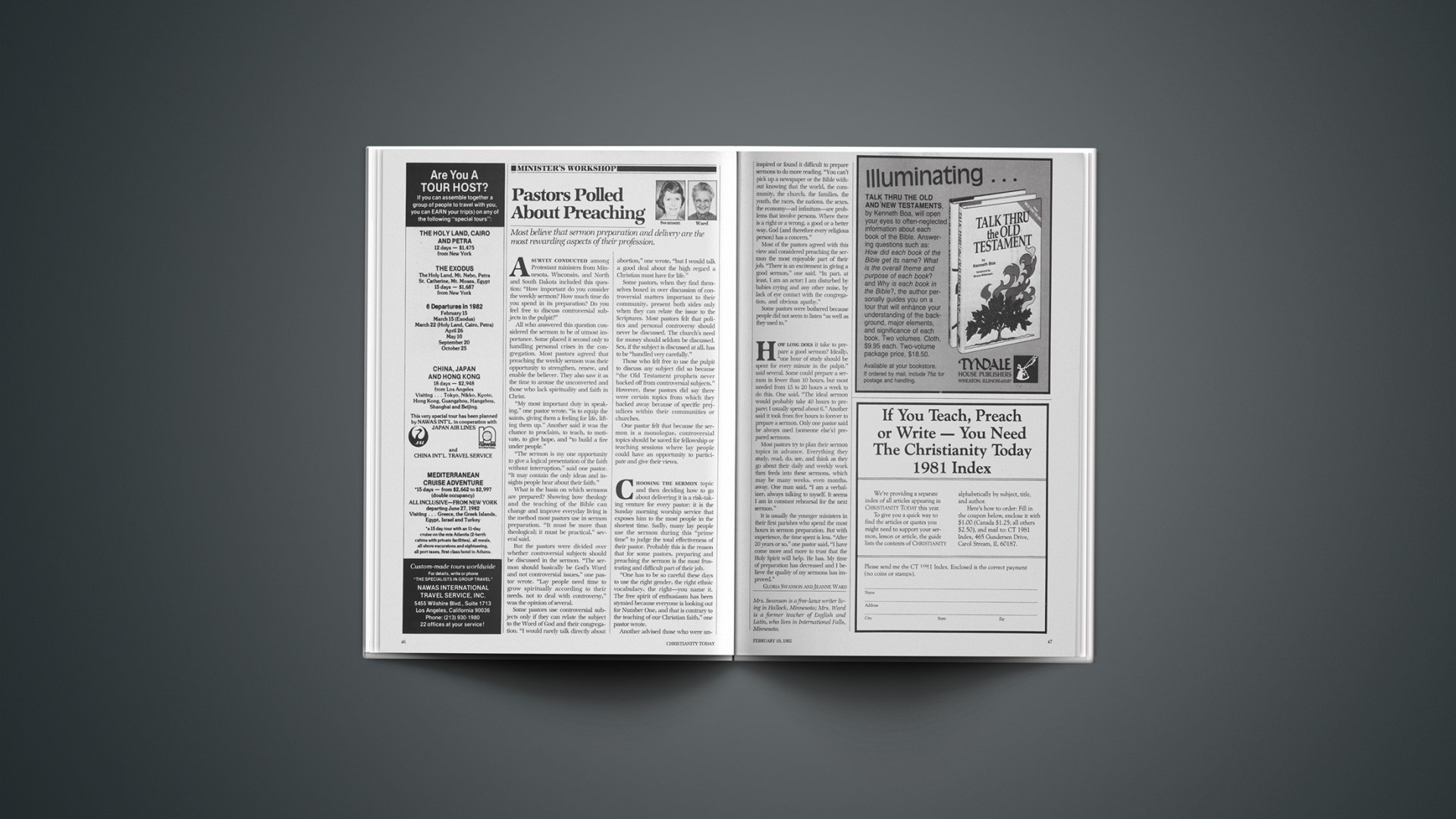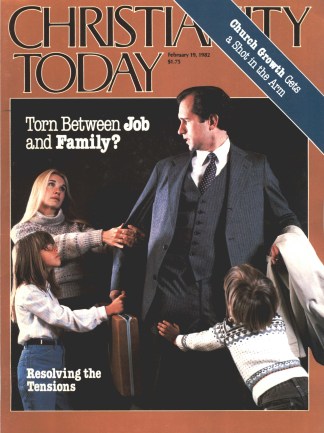Most believe that sermon preparation and delivery are the most rewarding aspects of their profession.
A survey conducted among Protestant ministers from Minnesota, Wisconsin, and North and South Dakota included this question: “How important do you consider the weekly sermon? How much time do you spend in its preparation? Do you feel free to discuss controversial subjects in the pulpit?”
All who answered this question considered the sermon to be of utmost importance. Some placed it second only to handling personal crises in the congregation. Most pastors agreed that preaching the weekly sermon was their opportunity to strengthen, renew, and enable the believer. They also saw it as the time to arouse the unconverted and those who lack spirituality and faith in Christ.
“My most important duty in speaking,” one pastor wrote, “is to equip the saints, giving them a feeling for life, lifting them up.” Another said it was the chance to proclaim, to teach, to motivate, to give hope, and “to build a fire under people.”
“The sermon is my one opportunity to give a logical presentation of the faith without interruption,” said one pastor. “It may contain the only ideas and insights people hear about their faith.” What is the basis on which sermons are prepared? Showing how theology and the teaching of the Bible can change and improve everyday living is the method most pastors use in sermon preparation. “It must be more than theological; it must be practical,” several said.
But the pastors were divided over whether controversial subjects should be discussed in the sermon. “The sermon should basically be God’s Word and not controversial issues,” one pastor wrote. “Lay people need time to grow spiritually according to their needs, not to deal with controversy,” was the opinion of several.
Some pastors use controversial subjects only if they can relate the subject to the Word of God and their congregation. “I would rarely talk directly about abortion,” one wrote, “but I would talk a good deal about the high regard a Christian must have for life.”
Some pastors, when they find themselves boxed in over discussion of controversial matters important to their community, present both sides only when they can relate the issue to the Scriptures. Most pastors felt that politics and personal controversy should never be discussed. The church’s need for money should seldom be discussed. Sex, if the subject is discussed at all, has to be “handled very carefully.”
Those who felt free to use the pulpit to discuss any subject did so because “the Old Testament prophets never backed off from controversial subjects.” However, these pastors did say there were certain topics from which they backed away because of specific prejudices within their communities or churches.
One pastor felt that because the sermon is a monologue, controversial topics should be saved for fellowship or teaching sessions where lay people could have an opportunity to participate and give their views.
Choosing the sermon topic and then deciding how to go about delivering it is a risk-taking venture for every pastor: it is the Sunday morning worship service that exposes him to the most people in the shortest time. Sadly, many lay people use the sermon during this “prime time” to judge the total effectiveness of their pastor. Probably this is the reason that for some pastors, preparing and preaching the sermon is the most frustrating and difficult part of their job.
“One has to be so careful these days to use the right gender, the right ethnic vocabulary, the right—you name it. The free spirit of enthusiasm has been stymied because everyone is looking out for Number One, and that is contrary to the teaching of our Christian faith,” one pastor wrote.
Another advised those who were uninspired or found it difficult to prepare sermons to do more reading. “You can’t pick up a newspaper or the Bible without knowing that the world, the community, the church, the families, the youth, the races, the nations, the sexes, the economy—ad infinitum—are problems that involve persons. Where there is a right or a wrong, a good or a better way, God (and therefore every religious person) has a concern.”
Most of the pastors agreed with this view and considered preaching the sermon the most enjoyable part of their job. “There is an excitement in giving a good sermon,” one said. “In part, at least, I am an actor; I am disturbed by babies crying and any other noise, by lack of eye contact with the congregation, and obvious apathy.”
Some pastors were bothered because people did not seem to listen “as well as they used to.”
How long does it take to prepare a good sermon? Ideally, “one hour of study should be spent for every minute in the pulpit,” said several. Some could prepare a sermon in fewer than 10 hours, but most needed from 15 to 20 hours a week to do this. One said, “The ideal sermon would probably take 40 hours to prepare; I usually spend about 6.” Another said it took from five hours to forever to prepare a sermon. Only one pastor said he always used (someone else’s) prepared sermons.
Most pastors try to plan their sermon topics in advance. Everything they study, read, do, see, and think as they go about their daily and weekly work then feeds into these sermons, which may be many weeks, even months, away. One man said, “I am a verbalizer, always talking to myself. It seems I am in constant rehearsal for the next sermon.”
It is usually the younger ministers in their first parishes who spend the most hours in sermon preparation. But with experience, the time spent is less. “After 20 years or so,” one pastor said, “I have come more and more to trust that the Holy Spirit will help. He has. My time of preparation has decreased and I believe the quality of my sermons has improved.”
GLORIA SWANSON AND JEANNE WARD
Mrs. Swanson is a free-lance writer living in Hallock, Minnesota; Mrs. Ward is a former teacher of English and Latin, who lives in International Falls, Minnesota.










